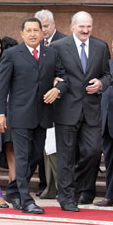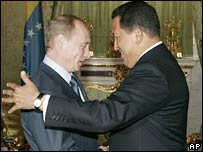Reader's Guide to Venezuela in the Chavez Era
It can be tough to find good, reliable reporting on the Chavez era. Truth is, most of what you'll find on the internet is strongly partisan and not really worth reading. This guide is meant to steer readers away from the mountains of propagandistic drivel out there and towards the more serious and competently researched writting on Chavez available on the net.
Journalistic Pieces
Probably the best introduction to Venezuela today can be found in these two articles by Alma Guillermoprieto from late 2005, which appeared in
The New York Review of Books. They're stylish, carefully researched, and scrupulously fair:
Don't cry for me, VenezuelaThe GamblerIn May 2006, this startlingly lucid feature on Chavez by
The New Republic's Editor Franklin Foer appeared in
The Atlantic:The Talented Mr. Chavez The best character profile of Chavez available online was written by Jon Lee Anderson for
The New Yorker back in 2001:
The RevolutionaryAn excellent, feature-length piece detailing Chavez's takeover of the Venezuelan State and its implications appeared on the January/February 2006 issue of
Foreign Policy. Written by Amherst political scientist Javier Corrales, it argues that Chavez is inventing a new form of authoritarianism for the democratic age:
Hugo BossJust after the December 2005 parliamentary elections, Italian journalist Guido Rampoldi wrote this piercing piece for Rome daily
La Repubblica. I like his style!
That Useless Election for the Red CaudilloThis long excerpt from the Interamerican Commission on Human Rights' 2005 Annual Report documents a number of the charges of political discrimination that have been leveled against the Chavez government.
IHCR 2005 Annual Report Chapter on VenezuelaIn this May 2006
Sunday Times opinion piece, Ian Buruma nails Chavez in one of the most clear-headed, digestable-to-foreigners anti-Chavez polemics I've seen in print.
Thank you, my foolish friends in the West
From the archives
At this point, my archive has over 600 posts ranging from detailed essays and long translations to flip little write-ups on current events. Here are just a few posts I think might be useful to someone coming to the crisis without much prior knowledge.
To put the Chavez era into perspective, it helps to know something about the recent history of the country. Lots of foreign commentators get Chavez wrong because they don't have a feel for historical context. This essay is meant to fill in the more important gaps:
The Petrostate that was and the petrostate that is One of the most confusing and misunderstood chapters of the Chavez saga is the brief coup that saw him kicked out of office for 48 hours in April 2002. The vast majority of the material available on the internet about the 2002 coup/countercoup is aggressively propagandistic and often plain wrong. In this essay, which I spent months researching, I try to summarize the baffling, fascinating story without airbrushing out inconvenient facts:
The Untold Story of Venezuela's 2002 April CrisisIn this short essay, I set out to explain why Chavez's vision of revolution is incompatible with democracy as usually understood:
The "democratic revolution" is a contradiction in termsCritical Theory of Chavismo
In trying to understand some of the stranger aspects of what's happened in Venezuela over the last seven years, I ran accross the writings of Jose Manuel Briceńo Guerrero, a Venezuelan philosopher/critical theorist/poet who wrote this fascinating essay, way back in 1980, about some aspects of Venezuelan culture. Briceńo Guerrero is, erm, not exactly light reading, but I still think this essay in particular is one of the most useful texts out there for understanding the Chavez phenomenon:
The Savage Discourse Later, I tried to write an essay specifying how Briceńo Guerrero's writing can inform an understanding of the Chavez era. It's part effort to bring Briceńo Guerrero up to date, part effort to place chavismo in cultural and historical context...I'm not really so happy with the finished product, but other people have found it helpful:
Towards a critical theory of chavismoWTO Stuff
When I'm not rambling about Chavez, I'm preparing a doctoral dissertation about the World Trade Organization. Here are a few posts on that entirely unrelated topic.
First off, there's my attempt to syntethize, in non-technical language, why it is the current round of WTO negotiations is hopelessly deadlocked:
Primer on the WTO's Triangular DeadlockSecond is this short write-up on the way the deadlock is concentrated on just a handful of products:
Arroz con leche, te quiero proteger...Next, a note on how the WTO's monstrously convoluted Agricultural Subsidy classification system came into being:
Creative Diplo-bureacrats and their Little BoxesThen, a write-up summing up the outcome of the December 2005 WTO Ministerial Conference in Hong Kong:
Taking Stock of Hong KongMy post from Day 4 of the Hong Kong ministerial, explaining the European Union's oddly inflexible position:
Mandelson's StraightjacketMy post from Day 3 of the Hong Kong ministerial, noting the developing world's increased engagement with the negotiations:
The WTO Turned on its HeadThis post from Day 2 of Hong Kong is an early attempt to deconstruct some of the more baffling aspects of WTO Diplo-bureaucratic jargon - particularly that most slipperly of formulations - "a balanced agreement."
Beginners' Guide to WTOese: "A Balanced Agreement"
Please comment responsibly:
|
Cheating Incomprehensibly
I do understand that eyes glaze over en masse when you turn to the subject of twin party slates as applied to mixed proportional representation/single member constituency voting systems...but hey, it's not my fault. It's the government that chose this particularly exotic mechanism to manipulate the vote on Dec. 4th.
Trying not to get technical, I'll just say that the "Twins" - Las Morochas - are a pretty dubious mechanism that allows the largest single party to greatly increase the number of seats it gets in parliament under our current, complicated voting system. The method seems plainly unconstitutional, since it's designed to circumvent the constitutional guarantee of proportional representation. But this hasn't stopped CNE from allowing the government to use it, or the opposition from defensively retaliating by coming up with a "Twin slate" of its own.
Well, the Supreme Tribunal
has agreed to hear a case on the constitutionality of the twins. CNE says if the Twins are ruled unconstitutional, the election will have to be delayed. We'll have to see...
Please comment responsibly:
|
Media Law Dynamics
Steven Dudley has
this to write in today's Miami Herald about the self-censorship dynamic at play since the Media Law came into effect:
Every time journalist Ana Karina Villalba enters a Radio Mágica studio to do her afternoon show, she sits in front of a photocopy of the many provisions of Venezuela's new media law. Whenever a guest says anything that may be interpreted as inciting violence or has sexual content, she reminds the guest of the law and its sanctions. And every time that happens, her boss reminds her that the station could be shut down.
No one has been thrown in jail or fined yet because of the 10-month-old law. But it has clearly forced the media to censor itself, especially when reporting on controversial President Hugo Chávez and his socialist policies.
More (free registration required)...
Please comment responsibly:
|
Repression-cum-farce
Twenty guys with BIG GUNS storm into your apartment one night. They say they're from the Prosecutor General's Office. They're looking for materials relating to [radical oppo lawyer and RR-fraud-conspiracy-theorist-in-chief] Tulio Alvarez's "terrorist activities." You explain to them, as calmly as you can, that Mr. Alvarez's parents-in-law did used to live there, but sold the apartment to you years ago. Oh. Erm. Rats. They leave, a bit embarrassed. The next day,
the prosecutors' office says it has no idea who the 20 guys were.
Please comment responsibly:
|
The Three Armed Forces
Yesterday's front page editorial in Tal Cual describes the alarming design of the new Armed Forces Law. This new LOFAN creates whole new military organizations and places them under Chavez's direct operational command, not under the traditional military chain of command. Teodoro Petkoff, who has always been a big skeptic about "cubanization" claims, seems to be catching up with new realities. I'll translate...As set out in the new Armed Forces Law, the National Reserve is completely independent of the military hierarchy; it's a parallel force alongside the Army, Navy, Air Force and National Guard. Unlike them, the National Reserve is in no way under the Defense Ministry's control. [Notice the shades of Garrido here -ft]
This radically alters the traditional doctrine of the Reserve. The raison d'etre for a Reserve was to provide back up manpower for the Armed Services in a hypothetical armed conflict, according to each service's specific needs. Previously, each service (Army, Navy, Air Force and National Guard) had its own Reserve Command in charge of training its own reserve batallions.
For instance, in the old scheme, if a tank driver (Army) was struck, he was replaced with a similarly trained reserve soldier coming from and trained by the Army. How will it work from now on? Will the National Reserve have its own armored divisions, its own infantry, navy, air force and national guard? If so, we will have a parallel Armed Forces - which, incidentally, is supposed to have far greater manpower than the four traditional armed services, according to Chavez's speeches.
We can only conclude that the National Reserve and the Territorial Guard were designed for purposes other than those for traditional Reserves. The duties assigned to the General Command of the Reserve and to its Commander include "bringing trained replacements to active units and Reserve Units engaged in combat operations" (though, as we pointed out, its very unclear how that will work) to taking part in operations to "maintain internal order."
And this seems to be the nub of the matter. If, one day, the National Guard is unable to cope with a situation, and the army is also overrun, we'll have a third organization (The National Reserve and Territorial Guard) involved in this sensitive task.
Given the very low likelihood of a foreign conflict, what has been created is an organization for internal repression, now directly commanded by the Commander in Chief/President.
What the new Armed Forces Law designs is a Pretorian Guard, not an Armed Force "at the exclusive service of the nation and under no circumstances at the service of any person or political faction," as written in article 328 of a Constiutition that, by now, reads like a subversive manifesto, so opposed is its letter and spirit to the government's conduct.
Please comment responsibly:
|
Chavez FAQ
Who is Hugo Chavez? He's the charismatic leftist/populist/autocratic president of Venezuela. A career army officer, Chavez tried to overthrow Venezuela's democratically elected government in a bloody coup d'etat in 1992. First jailed and later pardoned, he ran for president in 1998 and won with 57% of the vote. Two years later, he was re-elected with 59% of the vote.
Here's Wikipedia's biography of the guy...
What's your beef with him, basically? Chavez is destroying Venezuela's constitutional system. He has seriously undermined the institutions and values that underpin a real democracy.
But you just said he won two elections! how can you say he's undermining Venezuelan democracy? Real democracy means more than just elections. Real democracy means elections in the context of working democratic
institutions, like a vibrant legislature and an independent judiciary. And real democracy means respect for basic democratic
values like the separation of powers, tolerance of different points of view and respect for civil and political rights.
Under Chavez, we have elections, but we don't have working democratic institutions and we don't have respect for basic constitutional rules. Chavez has worked hard to take control of all state institutions, so no checks and balances operate. At best, you could call it an
"illiberal democracy," but whatever you want to call it, it's not real democracy.
So he's a dictator, then? Actually, I don't think he's a real dictator either, though many people would disagree with me. Under Chavez, Venezuela is is in a strange gray area somewhere between democracy and dictatorship...
Why won't you call him a dictator? At this point, it's too strong a word. Though there is less and less space for dissent, Venezuela still has lots of anti-Chavez political parties, NGOs, media outlets and activists.
A dictator would close down the parties and NGOs, censor the newspapers and jail the activists. Chavez has allowed the parties and NGOs to carry on, though more and more often he has used the police, the prosecutors, the tax authorities and the courts - all of which he controls - to harrass and intimidate them.
He hasn't directly censored the media, but he has imposed a new
Media Law designed to
induce them to censor themselves. He has
jailed a few activists, but mostly he has relied on intimidation to cow the others.
So Chavez isn't quite a dictator, but he sure isn't a democrat either.
What's really worrying is that he has turned more and more authoritarian over time. We may be in a gray area between democracy and dictatorship, but the tendency is towards dictatorship, not democracy.
If it's not democracy and it's not dictatorship, what is it then? It's a government in which one person possesses unlimited power, so I think we should call it
autocracy. You say Chavez has undermined democratic institutions, why? Chavez has worked hard to put die-hard followers in key positions of authority all over the state. I'm not just talking about the government, but - much more perniciously - all of the institutions that are supposed to oversee the government. At this point, all the courts, all the prosecutors, the human rights ombudsman, the anti-corruption inspectorate, the National Electoral Council, every institution in the state is run by unconditional, die-hard chavistas.
Sure, but all politicians put their friends in powerful jobs. What's the big deal?Under Chavez, this process has gone
much further than anything you could consider business-as-usual. No institution can stand up to the president. Judges who dare to rule against the government are unceremoniously sacked. Entire apellate courts have been shut down for disagreeing with him. The Electoral Council is controlled by chavistas and never makes a decision that doesn't favor the government.
By now, Chavez and his government are totally above the law. His supporters can steal as much as they want knowing that they won't get in trouble, because he controls the prosecutors and the courts. His opponents, meanwhile, face prosecution on the flimsiest of pretexts. Under such circumstances, corruption has mushroomed, and the basic right to dissent has been severely curtailed.
It's true that Venezuela has always had weak institutions. But, before Chavez, our institutions had some independence. In fact, the president Chavez tried to overthrow by force in 1992 was eventually impeached over a minor corruption charge and booted from office.
You keep saying Chavez controls the elections authorities, so are the elections clean?This is one of the most controversial topics in Venezuela today.
Elections are organized by a 5-member National Electoral Council. Four of the current members are chavistas. Every major decision the council has made since 2003 has favored the government.
Most Chavez opponents in Venezuela are convinced there was fraud in the 2004 referendum on whether Chavez should stay in office. However, international observers monitoring the election, including the Carter Center and the Organization of American States, noted several irregularities in the run-up to the referendum but said there was no clear evidence of fraud. Few people outside Venezuela believe the fraud theories.
The opposition counters that the observers had no experience monitoring electronic voting, and the elections council pulled the wool over their eyes.
The evidence the opposition has produced for fraud is complex, and hinges on the interpretation of strange patterns of electronic communications between electronic machines and their headquarters, together with complex statistical techniques for detecting fraudulent data. I'm not really qualified to evaluate it. However, most credible polls on the eve of the referendum had Chavez comfortably ahead.
So it's hard to say.
Independently of whether there was fraud in the actual vote tallying, however, there are clear signs of irregularities in several other parts of the process, including huge numbers of suspicious new voters in the electoral registry, and a general lack of transparency. Worse still, though the voting machines we use produce a "paper trail", the elections authorities have steadfastly refused repeated requests to tally all the paper ballots they generate, further fueling distrust in the setup. Opposition observers describe the electronic voting system as a "black box" - with good reason.
Still, Chavez says Venezuela is one of the most democratic countries in the world...He does, but he has a strange understanding of democracy. Chavez has consistently said he opposes "representative democracy" - which is the way most people understand the word - and supports "participatory democracy." At a hemispheric meeting in Quebec in 2001, Chavez was the only leader who refused to sign a document supporting "representative democracy." So when Chavez talks about democracy, he's talking about something different from what most people understand the word to mean.
What does Chavez mean by "participatory democracy"? I wish I knew! His statements about it have been very vague. Certainly, he uses the term to differentiate his idea of democracy from what most people understand the word to mean. You can get a flavor of what he means, though, from his repeated, fawning praise of Fidel Castro, as well as Libyan dictator Mohammar Khadaffi and the Iranian revolution.
So I don't really know what "participatory democracy" means, but it doesn't seem very democratic to me. One thing's for sure, there's a long history of non-democratic and anti-democratic movements that have claimed the word for themselves. Remember, the old communist East Germany was officially the "German Democratic Republic."
If he's so terrible, how come he keeps winning elections? Chavez is a deeply charismatic leader, who has built lasting emotional bonds with his supporters. Many of his followers are devoted to him with a kind of religious fervor. Most of them are very poor and don't care much about abstractions like the separation of powers.
Isn't he at least helping his poor supporters? Venezuela is a major oil exporters, and oil prices have been very high recently. Chavez has spent huge sums of windfall oil dollars on social programs aimed at the poor, which has made him very popular.
So that's a good thing, right?Every Venezuelan government since the early 70s has spent huge sums on the poor when oil prices rise, only to see that spending collapse when oil prices inevitably fall again. Like most Chavez opponents, I don't think you can solve the problem of poverty in our country by throwing oil boom dollars at the poor. It's been tried many times, and has always resulted in more and deeper poverty in the end. Deep reforms to diversify the economy are needed for long-term development and poverty alleviation. Under Chavez, Venezuela's dependence on oil has only deepened.
Didn't the US orchestrate a coup against him? The US government indirectly funded a number of anti-Chavez organizations that were later involved in his brief overthrow in April 2002. And the White House press secretary welcomed his overthrow when it happened. But that's a lot different from saying "the US did it." The April 2002 crisis was very complex and driven mostly by domestic political conflict. There is no evidence that the key generals who decided to oust Chavez had any connection with the US, and plenty of evidence that they were acting to prevent a massacre of government opponents. The story is very complex, and lots is still not known. You can read a detailed description of what happened
here.I dunno...can anybody who pisses off George W. Bush so much really be all that bad? Chavez uses anti-US and anti-Bush rhetoric cynically, with two purposes in mind. First, to get people like you to sympathize with him and overlook everything else about his government. Second, to justify moves to militarize Venezuelan society (to counter a hypothetical American invasion that will never happen) in order to maintain control of society. On both counts, he closely mimics a tactic honed over many years by his mentor and close ally, Fidel Castro.
What is Chavez's relationship with Fidel Castro, anyway? Chavez is Fidel Castro's number one fan. Venezuela and Cuba have signed 49 treaties since Chavez came to power, covering every aspect of social life. Thousands of Cuban doctors and sports trainers now work in Venezuela as part of an oil-for-services deal. It is universally believed that a good number of them are G2 (Cuban CIA) security agents. Venezuela is now Cuba's number one trade partner, and Chavez has repeatedly spoken of the Cuban Revolution in adoring terms, pledging to "fuse" the Venezuelan and Cuban revolutions. Chavez has often come to Fidel's defense in international fora, has championed Cuban interests to third countries, and often turns to Fidel for advice. It is believed that Chavez's personal security detail is made up of Cuban security agents.
How long is Chavez likely to remain in power? Who knows? At this point, though, he remains popular with his key constituency. The political opposition in Caracas is deeply fragmented, and discredited after years of failed attempts to get Chavez out of power. Moreover, his control over all state institution puts him in a strong position to stay in power even if the opposition gets its act together. Nobody really expects him to lose power anytime soon.
Where can I read more?In this
Reader's Guide to Venezuela in the Chavez Era.
Please comment responsibly:
|
The Trouble with Juan Forero
In today's
New York Times we see
a story by Juan Forero on Chavez's growing rhetorical anti-Americanism. It's heartening to read a story in a major US paper that questions the ulterior motives for Chavez's always-popular BushWhackery. Unfortunately, the piece fails to connect some pretty obvious dots.
Juan notices the obvious parallels between Chavez' and Fidel's rhetoric. But he doesn't push it. He doesn't mention the 49 signed agreements between the two countries or Chavez's repeated expressions of fawning, drooling admiration for Fidel, so he doesn't note the possibility that Chavez's talk is part of his push to "fuse" the Venezuelan and Cuban revolutions.
An outsider reading the piece could be excused for thinking it's just a funny coincidence how Chavez and Fidel seem to agree on what a bad guy Bush is. Coordination? Collusion? No signs of it here!
More annoyingly, and related to his failure to connect the Caracas-Havana dots, Juan entirely glosses over the little matter of the creepy "Reserva" created by the new Armed Forces Law. He doesn't explain how gringophobia is being used to justify the arming and paramilitary organization of chavista civilians. And since he fails to do that, it's not surprising the he entirely glosses over opposition fears that the reserva will, in time, be used to repress internal dissent - again along the Cuban "Comite de Defensa de La Revolucion" pattern, where ostensibly anti-invasion groups become, in practice, instruments of dictatorial control.
Which is the usual problem with Forero's reporting. He's not usually wrong, but he fails to tease out the (to us) obvious implications of the news he reports. He still seems to roll his eyes when the opposition talks about cubanization - even as Chavez makes it a more and more explicit plank. Forero gives you the flour, the eggs, the milk, and the sugar...but he never gives you the cake.
Please comment responsibly:
|
The No-BS Nuclear Option
Not to get too
Robertsonian about this, but
Alberto Garrido's interview got me thinking. As Garrido points out, Chavez's whole strategy is predicated on the hypothesis that the US will invade Venezuela sooner or later. Antichavistas usually see the asymetrical warfare stuff as a paranoid delusion, or as a government smoke-screen to justify setting up a repressive paramilitary aparatus to counter dissent.
But what if we borrow a page from Garrido and actually take the guy seriously?
Well, first we have to recognize that, under current geopolitical circumstances, with an overstretched US military struggling in Iraq and US defense strategists focusing narrowly on North Korea and Iran, the chances of an invasion in the short term are nil. Chavez the Military Man probably understands that, even if Chavez the Demagogue wouldn't say it.
So if he earnestly believes there will be an invasion, it seems reasonable to infer that he is planning to change the geopolitical equation somehow. To change it in some drastic way that would take a US invasion from the realm of paranoid fantasy to that of real possibility.
What could possibly get the Pentagon's panties up into such a frightful bunch that they would actually consider invading?
Well, you tell me.
Here are a few hints: over the last few months and days, one of Chavez's top tier intellectual advisors has gone on the record
arguing Venezuela should develop nuclear weapons. We've seen a bid from Venezuela
to buy a nuclear reactor from Argentina. We've seen Venezuela take a lone stand
in favor of Iran's nuclear program at the recently enNobeled IAEA. Even more ominously, we've seen Chavez
cozying up to North Korea, complete with language about launching commercial relations.
Now, what is the ONE and ONLY thing North Korea has to sell that Venezuela might like to buy?
Give up?
Please comment responsibly:
|
Listening to Chavez, Garrido Style
Alberto Garrido occupies a peculiar space in the universe of Venezuelan oppo punditry. While most antichavista hacks (including, I'm afraid, your truly) tend to just run their mouth about whichever Chavez outrage last caught their eye, Garrido has carved out an analytical niche by carefully scrutinizing Chavez's actual words, both now and in the past, and - novelty of novelties - taking the guy at his word.
Perhaps because he gives Chavez what he seems to crave most - detailed attention - Chavez actually praised him this year as the most objective oppo writer...which is VERY CREEPY given that Garrido has, for years, been one of the most consistent voices claiming that Chavez wants to implement what amounts to a dictatorship.
He's been ridiculed for implying that everything Chavez does has been planned out years in advance (Chavez hatched the plan to expropriate Polar when he was in kindergarten! He's wanted to change the name of the country since he was in the womb!) but the fact is the guy's been right so often - and the rest of oppo hackistry has screwed up so often - that I for one am ready to spend a Sunday evening translating
the interview he just gave to El Nuevo Herald's Casto Ocando.[This being the Sunday Supplement, I'll give myself permission to write (or rather, translate) a bit longer this time...]
Casto Ocando: How would you define this moment in Venezuela's revolutionary process?Alberto Garrido: It's a moment of historic change because Venezuela, barring the unforeseen, is becoming the second Latin American revolution, after Cuba. And we're witnessing a merger of revolutions between Cuba and Venezuela, which president Chavez has pointed to repeatedly.
CO: What makes you think we're facing a real revolution, rather than a series of acts that often seem incoherent?AG: They're not incoherent. Rather, we're in a transition. Because you have to remember that Chavez gained power through the ballot box, not through armed struggle. He can't simply replace the old regime, like Fidel did, like the Chinese and Russian revolutions did. So he started out governing in the straitjacket of the rule of law within representative democracy. And yet, he has very resolutely followed a strategy set out years before in the so-called Valencia Assembly of MBR-200 (Chavez's original party), which had decided to accept elections as a tactic for taking power within representative democracy in order to replace it.
CO: Is Chavez replacing democratic institutions for revolutionary ones?AG: We should be very clear on the definition of democracy. In 2001, at the Quebec Summit, Venezuela refused to sign a declaration backing representative democracies. We're seeing a plan hatched from within the state to create a parallel, revolutionary state.
CO: Which are those parallel institutions?AG: Well, we used to have a separation of autonomous powers, in the style of representative democracy. By now Chavez, who knows perfectly well that revolutions are hegemonic and not pluralistic, has very skillfully, almost following the Fujimorista playbook for controling institutions, managed to tilt the public powers in order to place them at the service of the revolution.
CO: Don't you think that rather than Fujimori, he's following the Cuban experience?AG: No, because as Fidel said a few days ago, "we don't believe in democracies or in elections." In Chavez's case, elections are legitimizing instruments. Fidel doesn't need elections for legitimacy. He's the revolutionary boss and that's that. On the other hand, electoral legitimation has been fundamental for Chavez, because it's his protective armor vis-a-vis the rest of the world.
CO: That explains chavismo's control over the electoral institutions?AG: Not just the electoral institutions which, as we all know, have always been the product of a political discussion.
CO: But now it's entirely dominated by chavismo.AG: I think Chavez already announced that the Assembly, which will change in December, will have over 80% of revolutionary members. Not long ago, the chairman of the Assembly, Nicolas Maduro, already said the next Assembly will legislate to establish the bases of socialism. It's a process towards socialism.
From the Venezuelan left, Chavez is often attacked by those who say there hasn't been any revolution, and they forget that Chavez has recognized that there is no revolution. What there is is a revolutionary process, there are a series of changes tending towards a revolution that hasn't happened yet, and that's expected to unfold over a given period of time which could extend to two decades including the so-called consolidation period.
CO: Which elements of the Cuban system is Chavez successfully applying in Venezuela?AG: There are 49 signed agreements, which cover practically all areas of national life. The most important are in health, education and literacy. There are growing high-level military links.
There's always a lot of deafness regarding what Chavez says, and we need to listen to Chavez closely, because whatever he says, he does. Chavez has said that the revolutionary processes of Cuba and Venezuela, more than towards integration, are marching towards fusion. We're talking about a revolutionary merger.
CO: Does this transitional process involve also a greater police control and greater state security in Venezuela?AG: It's like this. A new Framework Law for the Armed Forces (LOPAN) has just been approved. In the LOPAN they talk about six components. You have the four classical components of a regular military: Army, Air Force, Navy and National Guard. They add the reserves. But moreover, they add the Territorial Guard, with resistance duties. Because the entire civilian-military structure is organized around a war hypothesis, which Chavez has defined as Asymmetrical Warfare.
CO: That is, resistance against a possible invasion.AG: There is a new defense doctrine in place. An army General, Isaias Baduel, has formulated for hypotheses for possible wars. One: a growth in the border conflict with Colombia. Two: the possibility of a multilateral intervension under a UN or OAS mandate, which I see as very unlikely. Three: a coup d'etat. Four: the possible US invasion of Venezuela.
CO: There are reports of discontent within the armed forcesAG: That may be so, but the problem is that restricting the analysis to the inner workings of the Armed Forces is a major mistake today. The process is horizontal accross the civilian-military divide, and it grows day by day. We're not just facing a single regular force, which would be the traditional framework. We're facing a horizontal force, where we find parallels with the Cuban framework. In Cuba they call it the Guerra de Todo el Pueblo; in Venezuela they call it Defensa Integral de la Nacion.
CO: How far are people to follow Chavez blindly in all of this?It's impossible to say for a single reason: there's a numerically significant opposition to Chavez. That opposition has no leadership, it doesn't feel represented by those leaders who constantly show up in the media. For me, the most important opposition Chavez faces today is inside his own organization.
CO: Fidel Castro managed to discipline his followers even through the use of terror. What about the proverbial indiscipline of Venezuelans when it comes to following a party line?AG: There have been many warnings, from Chavez and his main political operatives such as Deputy Willian Lara, asking for reasonableness in internal dissent. That dissent is not an antichavista dissent, it's an internal dissent against the management of the process by the chavista government.
CO: There are those who say that the revolution will last as long as the money.AG: Was there money in the Soviet Union? In China? Is there money in Cuba? Did they have money in Nicaragua? No!
In fact, just the opposite. The excess of money has really hurt the central factor in the process, which is ideological and moral. Because if Chavez himself recognizes that there is corruption in his government, that corruption is there because there's an overflow of money. The cabinet keeps tossing around trillions and trillions of bolivars, but you never see facts on the ground that reflect the supposed investment. So Chavez will need to distance itself from that whole corrupt sector that surrounds him if he really wants to push forward a revolution with clear ideological content.
CO: What factors could do Chavez in?I don't know if it makes sense to talk about "doing Chavez in", because the process has advanced so far that, with or without Chavez, we're going to see some events not just in Venezuela but in other parts of Latin America.
CO: You seem to see the revolutionary process with optimism.I don't know what optimism means. In Venezuela we need to be realistic, you can't be either pessimistic nor optimistic. Of course, we will have a crisis. We still haven't seen an explosive crisis, and we will see that in the not too distant future.
CO: Will Chavez lose power through the ballot box?Representative alternation is not foreseen in a radical revolutionary system such as the one Chavez is putting forward. One of the central slogans is "there is no turning back from revolution." Chavez keeps saying he'll be around until 2030.
Please comment responsibly:
|


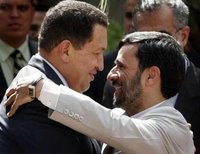
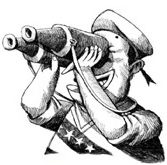
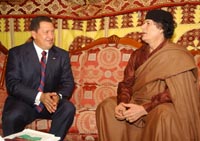
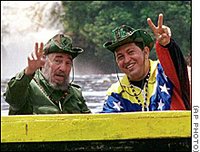
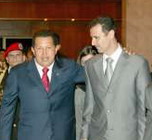
 Site feed
Site feed 